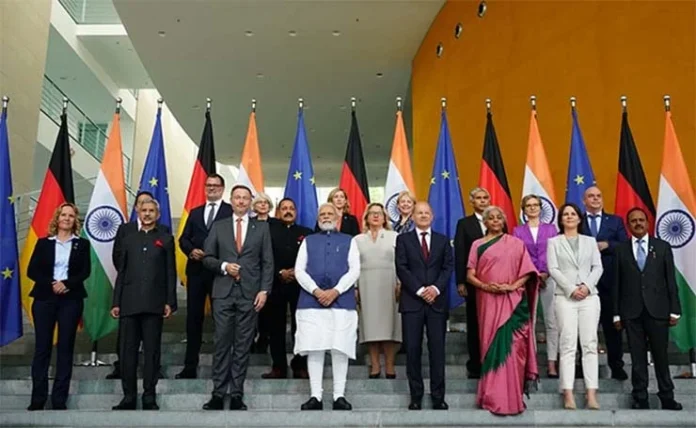In the 2022 Independence Day address, Prime Minister Narendra Modi gave a clarion call for shedding the colonial era mindset1 which is still entrenched in the psyche of many Indians even after 75 years of independence. In this context, it is necessary to underscore the significance of India’s historic assumption of the G20 grouping presidency. While the spectre of colonialism is long dead, it continues to loom large in the psyche of many developing countries of the global South thanks to its institutionalisation by the former Western colonial masters by overt and covert means. In many countries, the colonialised native elites still rule while being largely ignorant of the indigenous value systems and institutions of their respective countries.
India in such a situation has played a historic role. Not only has it become a paragon of home for other countries of the global South but has emerged as one of the most powerful Asian countries both economically and politically over the last 75 years.
Right after independence, India took it upon itself to act as the third pole in global politics, its leadership of the Non-Aligned Movement (NAM) and its championing of the independence movements of several erstwhile colonised countries including Indonesia and Algeria demonstrated India’s commitment to never fall prey again to colonialism and imperialism. The stalwart leadership of our first Prime Minister Pandit Jawaharlal Nehru despite his own shortcomings as an individual and leader played a crucial role in steering India towards a glorious future shorn of its coloniality.
India became the voice of the developing world that Asia, Africa and Latin America will grow on their own terms and not in accordance with what Daniel Lerner calls the notion of modernisation as ‘westernization’2.
Historic moment
India’s presidency of the G20 grouping, the biggest grouping in the world in terms of population and economic strength, is historic. Never before the world’s largest democracy and oldest living civilisation with innumerable hues and shades got the opportunity to host this prestigious summit. It is also historic because the global South has hailed India’s role in the past over voicing their interests in such elite forums which have been traditionally dominated by the West.
Particularly relevant is the role that India will play on the issue of debt restructuring of several countries which have been reeling under this pressure owing to a lack of recovery from the devastating effects of the COVID-19 pandemic and global inequity due to the pernicious effect of financial globalisation and neo-liberal economics.
India is well expected to raise another crucial issue of climate finance and the transfer of financial resources from the developed (read the West) to developing countries to mitigate the adverse effects of climate change. India’s presidency also highlights the fact that the West can no longer escape its historically mandated responsibility to take the lead role in combating climate change and global warming, the buck cannot be passed to the global South.
Decolonising the Indian psyche
In light of India’s historic moment, the time has come to decolonise the Indian psyche. For this, it is imperative that the postcolonial school of thought which critiqued colonialism and imperialism from a political standpoint but failed to deconstruct its fundamentals gives way to the decolonial school of thought. The distinction of this school of thought lies in exposing the basically evangelical nature of Western ‘modernisation’ and giving primacy to indigenous customs, traditions, and institutions.
Anibal Quijano, a Peruvian American sociologist, has done pioneering work in the field of the decolonial school of thought3 in the Latin American context and coined the term ‘decoloniality’, his research and findings can be very well implemented & blended in Indian academia and civil society circles. J Sai Deepak, the author of the best-selling book India That is Bharat-Coloniality, Civilisation, Constitution4 argues that the decolonisation of the Indian mind will require shedding the archaic colonial mentality of everything that is great is essentially European in nature. This will require according primacy to the Indic consciousness and reviving the institutions and ideas of the Indic civilisation which has evolved over the years.
However, given the fact that Westernisation and coloniality as a phenomenon are too strong to be uprooted root and branch, the best way forward is to ensure a happy blend of Indic and Western thought and ideas that are not ethnocentric or Eurocentric for that matter. However, priority must be given to Indic values and Indic ideas in the process conservatism and majoritarianism must not be allowed to creep into this unique Indic consciousness. This is most relevant in the field of education as G.N. Devy points out5.
Decolonising the Indian psyche is, however, not an overnight process, it will take time as a change in the habits of the people of our great country will be a massive socio-psychological process that will require the support of intellectuals from across the political spectrum.
Conclusion
The world order’s power dynamics are changing fast, it is time that such a shift in dynamics takes place in the mindset of people. Therefore, the decolonisation of the mind must be limited not just to India but also to the developing world or global South, only then a truly inclusive world order can be established.
References
- https://www.timesnownews.com/india/full-text-of-pm-modis-independence-day-speech-2022-article-93572730
- https://bibliothek.wzb.eu/pdf/2004/p04-003.pdf
- https://subjectguides.library.american.edu/c.php?g=1025915&p=7715527
- https://www.bloomsbury.com/in/india-that-is-bharat-9789354350047/
- https://indianexpress.com/article/opinion/columns/g-n-devy-writes-replacing-western-knowledge-with-indian-knowledge-could-result-in-intellectual-disaster-8561778/
–The writer is currently working as a Research Associate at Defence Research and Studies (dras.in) and is a columnist. The views expressed are personal and do not necessarily reflect the views of Raksha Anirveda
–The writer is currently working as a Research Associate at Defence Research and Studies (dras.in) and is a columnist. The views expressed are personal and do not necessarily reflect the views of Raksha Anirveda






